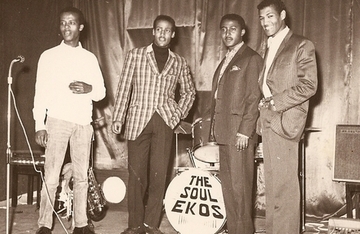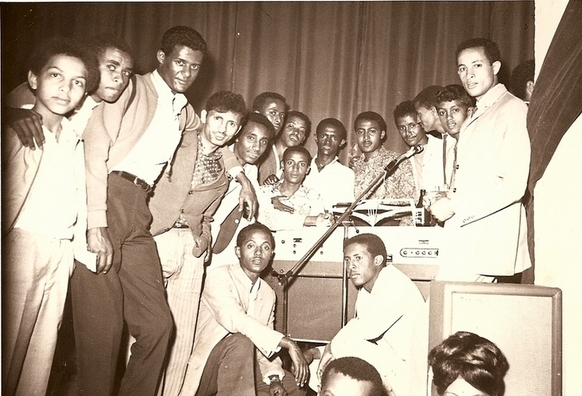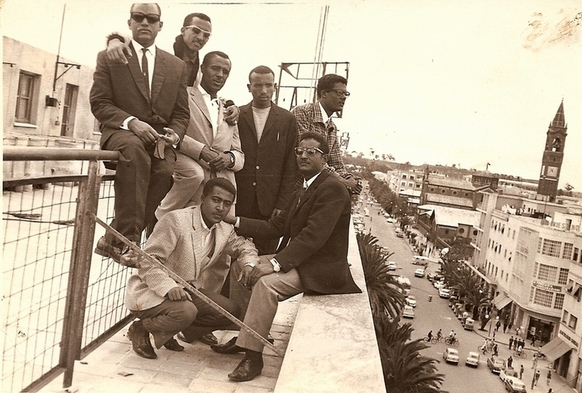 From left - The drummer Tesfaye mekonnen (Hodo); guest singer from Asmara police orchestra, Teshome Mitiku & Bass and sax player Fekade Amde Meskel of Soul Ekos Band. (Courtesy photo)
From left - The drummer Tesfaye mekonnen (Hodo); guest singer from Asmara police orchestra, Teshome Mitiku & Bass and sax player Fekade Amde Meskel of Soul Ekos Band. (Courtesy photo)
Tadias Magazine
By Martha Z. Tegegn
Published: Thursday, August 12, 2010
Washington, D.C. (TADIAS)- Part two of our exclusive interview with Ethiopian music legend Teshome Mitiku highlights his reasons for his abrupt departure from Ethiopia forty years ago, his favorite song from that era and his experience working with Mulatu Astatke, the father of Ethio-jazz. Teshome is scheduled to accompany the Either/Orchestra at the 32nd Annual Chicago Jazz Festival in September.
You were a teenager when you started performing in clubs. How did your parents feel about that?
My father had already passed away. My mother was very supportive. My mother’s only concern was that I continue to go to school, but she never stopped me from playing, just worried about me. She is a great mother. She was a great singer too. She used to sing Bati, Ambasel, Anchi Hoye. Her words and lyrics were poetry and they are very touching. I mean I used to sit and cry as a child when my mother used to sing while she was washing clothes, ironing or cooking. So I guess my mother’s emotional singing had an influence on me. My mother was always my friend. As a teenager when I started working in clubs and begun making money, I used to take her to a hair dresser, to a café, piazza, everywhere and whatever she wants I used to buy. My mom always came first for me. So I have always done that, I still do that. She is a beautiful woman with a heart of gold. My mother loves her life, even today she tells me “as long as you are doing good I am happy.” What I really appreciate about her is she brought me up as a care-free kid. She allowed me the freedom that I needed. And when I left the country, I thanked her for it.
You left the country abruptly. When did you leave Ethiopia and why?
I left the country on January 27, 1970. The last few years of the 1960s was a very critical time in Ethiopia. Even though the music scene was upbeat, there was also an undercurrent of social discontent. We were not political at all, but we were very popular at the time and people used to come from all corners to watch us. I believe the security people had an eye on us. So, at the end what happened was that we did a show at the Haile Selassie University in Addis Ababa. That was, as I recall, the last major show I did in Ethiopia.
Why so?
Because they made it so, they made it the last time, it wasn’t me. When Soul Ekos band was performing at the University, there were about four to five thousand people there. I mean Lideta Adrarash (Hall) was packed; everybody was there. It was a period when students were engaged in open rebellion against the authorities. So the army and the police were there keeping an eye on the kids and the situation. So when we took the stage Seifu Yohannes did the first three songs. And when my turn came and I was warming up to do the usual popular songs, the crowed started to demand that I play Fano Tesemara. I replied “I cannot sing that right now, are you crazy?”
Why? Was it a political song?
Oh yes (laughter), Fano Tesemara was a political song (Fano Tesemara ende Ho Chi Minh ende Che Guevara). Then I said, I can sing it for you but can you handle what’s gonna happen afterwards? The kids shouted “yes Teshe come on.” And I said to them let me first sing Almaz Min Eda New. They would not have any of it. I mean they were demanding that I sing Fano first. Then I had to speak with the police about it. They were vigilantly watching, the army, the Kibur Zebegna (the imperial guard), all of them were there with their AK-47s. The security was literally on the stage. So I asked the army guy, “what do you want me to do now?” By then the students were already singing Fano Tesemara and they were saying Meret larashu (land to the tiler) and so on. I turned to the the army captain again. He said “Go ahead, you can sing it.” The crowd went wild.
You took a chance.
Yes I did, I was allowed to sing it, but that was the end of happy and innocent days for me. I never had any more peace after that. I was continuously harassed, investigated, and was suddenly asked to pay three hundred and fifty thousand Ethiopian Birr in tax. I was shocked. I said what? Then, once I was scheduled to perform at Zula club they came and took me to Sostegna tabia (3rd police station) and kept me for three days with all sorts of fabricated accusations. I had the sense that they were planning to put me away for good. That’s when I left Ethiopia.
Where did you go?
I had a visa for Sweden and Denmark, and I went to Copenhagen for a while.
Before we talk about your years abroad, what is your favorite Soul Ekos song from those days?
Woooooooow, wow wow, very hard question…they all hold special place in my life but I think Mot Adeladlogn I love the poetry. It is almost like Romeo and Juliet. It is romantic.
During your brief but illustrious career in Ethiopia, you also worked with several Ethiopian greats, including Mulatu Astatke. What was that experience like?
Working with Mulatu is like having a buffet of music. Mulatu is music himself. I have collaborated with him on many occasions. I worked with him way back in the 60s and later in the 90s here. We did Wolo songs together. I love working with Mulatu. He gives the singer or the artist a chance to express himself. He never competes with you or tries to push you. He always tries to understand the music first. Once he gets it, then he lets you express it. When you work with him it is you who is working. I wish I could work with him more often than I did.

This photo was taken at Bingo Club in Asmara in 1969. Shown third from left is Theodros ( Teddy )
Mitiku, the 9th person is Alula Yohannes and next to him is Teshome Mitiku. (Courtesy photo)

The band members and friends vacationing in Asmara, where they used to play on weekends at
Kangawe Station, an American Military base. Teshome is almost seated. (Courtesy photo.)
–
Related:
Part Three Exclusive: Teshome Mitiku Plans to Return to Ethiopia
Part One: Exclusive Interview With Ethiopian Legend Teshome Mitiku
Listen to Gara Sir Nèw Bétesh – song written by Tèshomé Mitiku and played by Soul Ekos
Join the conversation on Twitter and Facebook.



























Marti,
You are punishing us. I have no choice now but wait another week. I think you should throw in some of Teshe’s favorite numbers as consolation.
Before I forget. Need to do an Amharic version too.
First of all thanks to Tadias for bringing us Teshome this time. My hat goes off to Teshome for his great musical talent and contribution to modern Ethiopian music. It seems that the 60s and the 70s were the prodigious decades in the history of Ethiopian music. As a child I grew up listening Teshome’s music on the radio and tape recorders. Now, after 40 years he is still one of my favorite singers. GARA SER NEW BETESH is so entertaining; I wish Martha had asked Teshe, what it really means. “MOT ADELADELOGN “is another great piece which brings millions of memories. Thank you Teshome for your great music, I enjoyed the nostalgia.
Great stuff. I also love Gara sir. The beauty about that song is that everyone has their own individual interpretation about it. My uncle used to say that it was about sex and it is a very sexual song. For me personally though it reminds me of my aunt’s place where I used to spend summers in Debrezit. Of course Teshu described his version, speaking in the context of song-writing in part one: “Like Gara sir new betish, for example, is about our house in Kebena where I grew up. When I wrote it the title was kebena new betish, that was the idea. And the house where I was born in and grew up in Ethiopia was just right under the hill (gara) and Kebena river is right under the bridge very close to the water.”
Betam, yemaital, yemailewet, yamytegeb zefen! Thanks for the love.
My older sister grew up listening to and singing Teshome’s songs; and then every songs of Teshome passed onto me and began singing his songs since then. Teshome is irreplaceable and will always to be a treaure to Ethiopia. His songs are sentimental, poetic,and unforgetable.
What a wonderful recollection of memory! “Teze Allengn Yetentu.”
Teshome…you have graceful music and I love all your songs. I would also like to know the meaning of the song “Gara Sir“. God Bless!!
Teshome’s “Gara Sir” has more than a romantic expression of a man who longs to be closer to his lover. His song is incurably convincing that, distance plays a brutal role for any longing heart and that being away from loved ones compells one to look beyond Ke Garaw sir in tearful eyes. The song has the power to renew itself and will have yet to impact the future generations.
Thank you Teshome and I would love to bless you in a manner Emahoy of our village used to bless us.
Ke Ketir ganen
Ke Lelit megagna
Ke gorebet mikegna
Ke Hidar beshita
Ke ginbot tiktik
Ke menged lay zinab
Ke Hamle berdo
Ke sew hager merdo
yesewurwo, tuary kebari ayasatawo
Weladite amlak alehu alehu tibelwo.
Kerchele
Thank you Dereje, it seems that I skipped Teshe’s explanations of “GARA SER”. As you said,it is easy for others to come up with different meanings.
Nostalgia!!! Teshome left Addu Genet when the melting pot of our beloved country begun to loose its sons and daughters. When revolutionary fervor was cooking in the campus, especially after the heroic hijacking attempt by Martha Mebrahtu/ the daughter of General mebrahtu, Tadellech Kidanmariam/ the daughter Abateri from Adwa/ and wallelign Mekonnen. We the ” jolly jacks” as the “Revos” were calling us then were trying to emulate Teshome. Bejoche iyedassesku….. and Mot adeladlogn…
Teshe, Lucky that you left earlier. We ended up singing for Kebelle bands to save our {behind} from red Terror…..
There is an Ethiopian literary tradition called Qine, a genre of Amharic poetry full of secret meanings. Tesh is obviously a well-versed person not only in the Amharic language but also in the cultural sounds of Bati, Ambasel, etc, as he learned it as a child through listening to his mother. But with this particular song, I don’t think he had any idea that people would interpret it in so many ways. That is the case with many great poets and writers.
What makes this song special is that Gara Sir evokes a common memory of love, longing and country with a meaning that is personal to each person.
But to put things in perspective, let’s come back to Qine. Aleqa Gebre Hanna, known for his “his quick and biting wit,” was the king of this Ethiopian tradition. As Simon Messing wrote: “The Amharic language lends itself readily to puns and hidden meanings, since many verbs have double or triple interpretations due to the hidden variations in the basic verbal stem and the absence or presence of gemination of some consonants. The listener must pay close attention. If he misinterprets the context and fails to discern the pun, he is often made the butt of the next tricky joke by those who have heard it before. The more a storyteller and wit masters the sowaso ‘grammar’ of the Amharic language, the better he can manipulate the humor. Alaqa Gabra Hanna was a master of the sowaso grammar, as demonstrated by one of his best-known stories. One day the Alaqa encountered a peasant with his donkey, and bowing low asked greeted him with Endet adaratchu? (“How did you sleep?”) Only afterwards, as the man told of the encounter did he realize that the Alaqa had used the plural form of “you”, not the singular: Alaqa Gabra Hanna spoke to the donkey and its owner as equals.”
This is a great job TADIAS ! keep it up! Tehse is my favorite singer of all time. It was an honour for me to have met him in Virginia two years ago to learn more about the intellectual side of Teshome Mitiku. Teshe is not only an artist but also an accomplished scholar with an amazing insight on varitey of social and political issues. He is a real treasure. God bless you Teshe!!!!